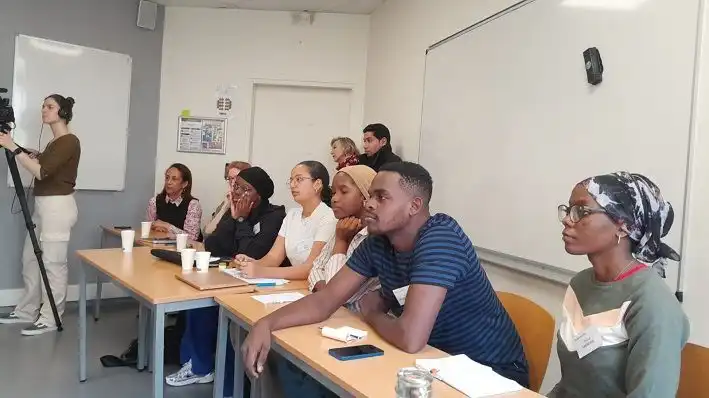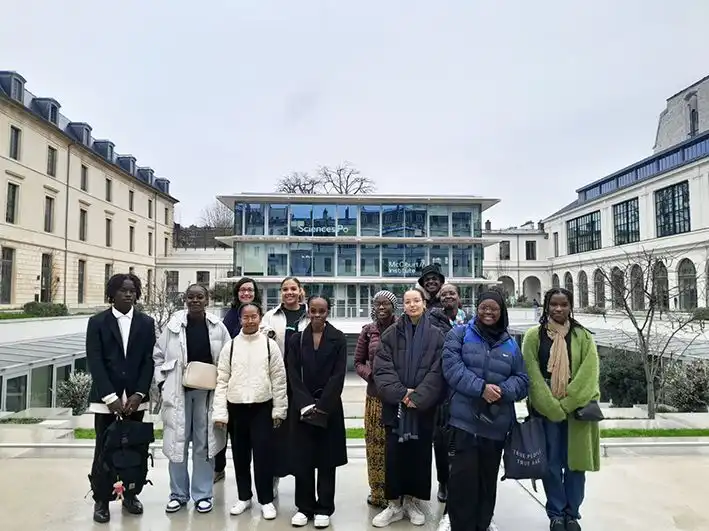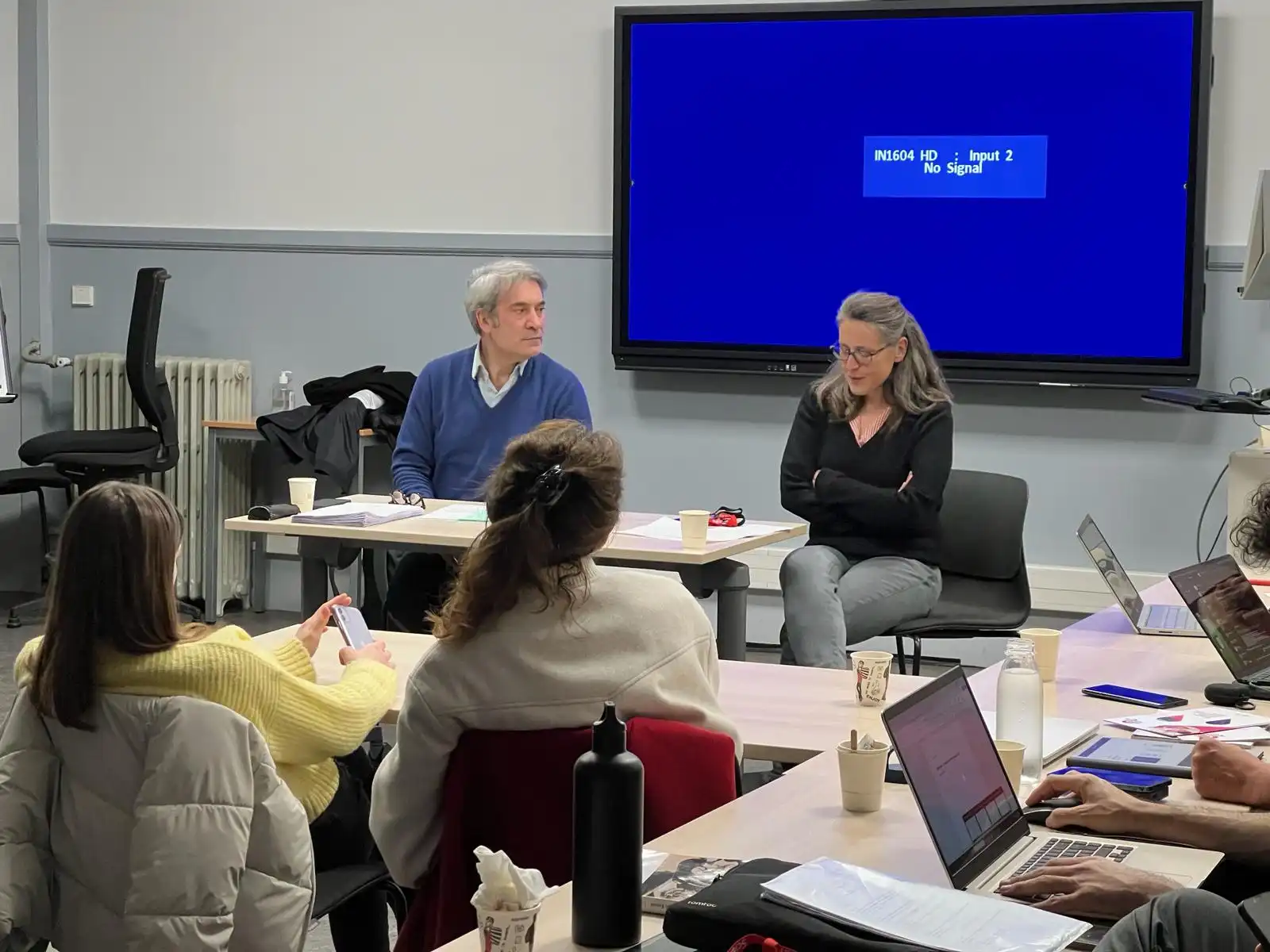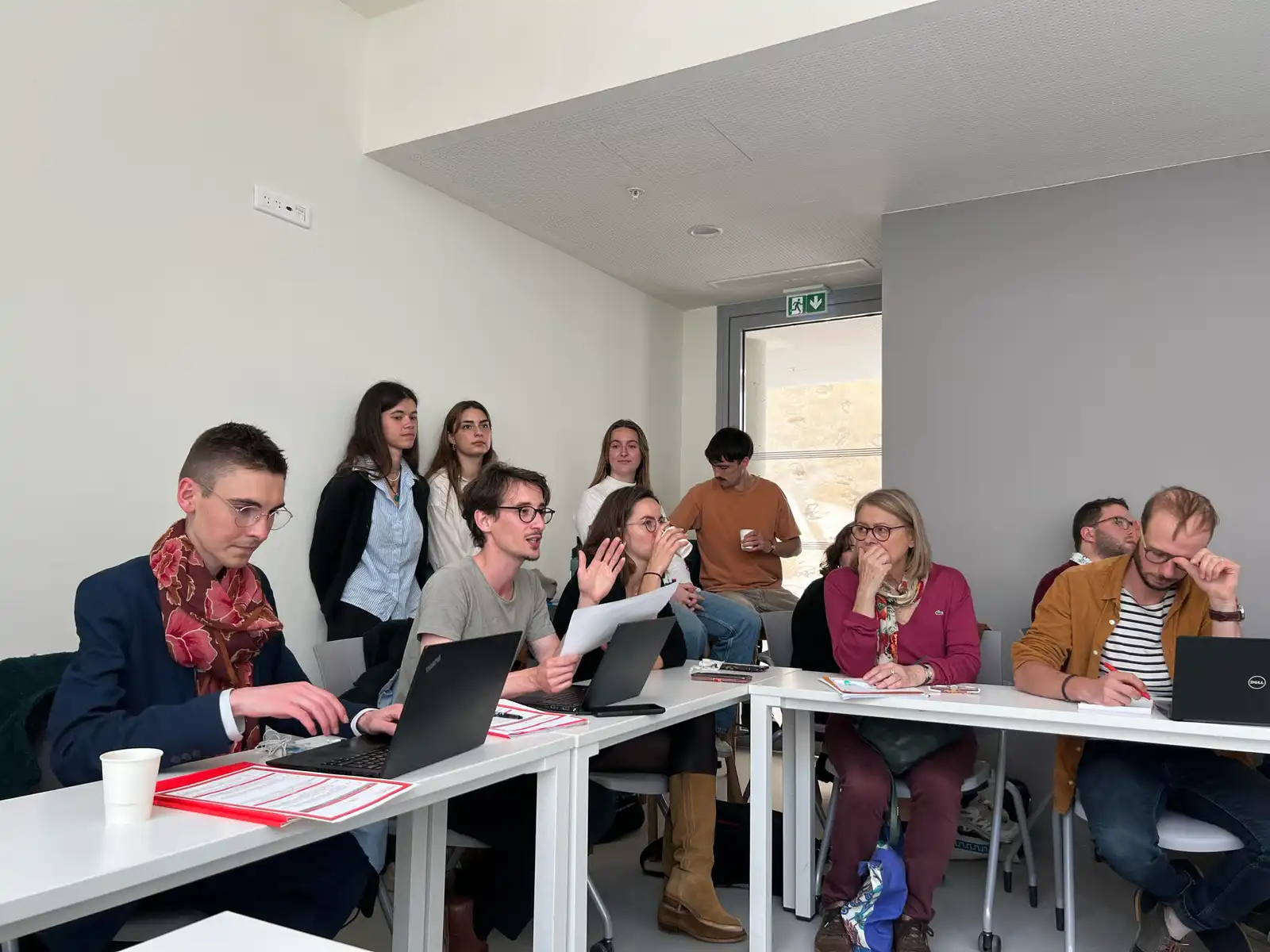
Home>Publications and knowledge>Knowledge transfer
Knowledge transfer
The Institute supports the transfer of knowledge generated by research and training into initiatives that meet the needs of society.
THE TRANSFORMATION FORUM
The knowledge produced by members of the Sciences Po community is accessible to the wider public and civil society with a specific focus on:
- high school students, in particular via Sciences Po’s Equal Opportunity Programme, which oversees projects developed with high schools in the CEP (Conventions Education Prioritaire) network
- recent Sciences Po graduates and young alumni, through initiatives led by Sciences Po Careers and the Sciences Po Alumni professional groups
- Professionals who want to contribute to the environmental debate or redirect their professional lives in this field.
- the general public interested in the challenges of digital transformation

Stimulating students' ambitions and helping them apply to university, enriching their vision of the world and their general culture, exchanging views with leading political and economic figures: these are the purposes of the Discovery Days organized for some of the high schools in the Equal Opportunity Programme network, which has been run for over 20 years by the Pôle Egalité des Chances at Sciences Po.

10 students from the Lycée des Lumières in Mamoudzou (Mayotte) spent a week of immersion in Paris in March 2024. The program included a day of debate on governance and access to water at Sciences Po, organized in partnership with the Institute for Environmental Transformations. Read their logbook (FR)
Sciences Po Carrières prepares, accompanies and facilitates students' entry into the world of work, from the first year of University College to two years after graduating from Sciences Po, in collaboration with teachers and employers, by organizing nearly 300 events each year to raise awareness of specific career paths.

The SCIENCES PO EXECUTIVE EDUCATION teams design courses designed to support individuals in their personal and professional development; some of these courses are dedicated to the ecological transition and societal responsibility.
In early 2024, Sciences Po Executive Education, Ecole Urbaine and Fonds Latour, in cooperation with the Institute, invited Stéphane Raffalli (Mayor of Ris-Orangis), to take part in a masterclass dedicated to the creation of the Laboratoire des doléances, an innovative exercise aimed at redressing social and environmental injustices.
The “Laboratoire des doléances” (Grievance laboratory), an initiative based in Ris-Orangis and born of Stéphane Raffalli's collaboration with Bruno Latour during the confinement, highlights the municipality's commitment to a sustainable and irreversible ecological transition. The presentation, and the exchanges that followed, underlined the importance of collective action and participatory democracy in shaping inclusive and responsible territorial public policies, while facing political and socio-economic challenges. Active citizen participation, the desire to reconcile ecology and prosperity, and the need for coordinated public action emerged as key elements in this approach.
PARIS recherche
The Institute for Environmental Transformations participated in the inaugural event of Paris Recherche, an initiative of the City of Paris aimed to create links between the Parisian research community and the general public, with presentations by Urban School students and CRIS and CERI researchers and graduate students on urban transformations.
“sources” platform and the sciences po library
Produced and edited by the teams at Sciences Po' Institut des Compétences et de l'Innovation (ICI), the SOURCES platform is Sciences Po's portal offering the general public open access to a wide range of audiovisual and written content.
A special “Focus” on Environment Penser et s'engager face à l'urgence environnementale (FR) is available.
Files from the Sciences Po Library
The library offers a wide selection of books, articles, reports, archive documents, podcasts, films, documentaries, novels, etc., to borrow or consult in its reading rooms and thematic guides. Access is open to the public by registration, and a number of online sources are freely available for consultation. Some thematic files :
THE POLICY FACTORY
Beyond dissemination, the knowledge produced at Sciences Po can be essential in formulating recommendations for public and private actors. A distinction is made here between :
- Research-based analyses: the production of research, mainly from research centers, intended directly or indirectly for public and private decision-makers, in the form of reports, notes, and policy briefs,
- Pedagogical initiatives: practical programs and workshops developed within Sciences Po’s graduate schools, aimed at training students to combine theory with the application of acquired knowledge and methodologies.
RESEARCH-BASED ANALYSES
These analyses, aimed at public and private decision-makers, come in the form of a wide range of written products, analyses, decoding notes and policy briefs. These are produced by Sciences Po research centers such as OFCE, CERI, CDSP and CEVIPOF, as well as LIEPP (Interdisciplinary Laboratory for the Evaluation of Public Policies) and think-tanks such as IDDRI, a partner of the Institute.
- VOLPICELLI, Gemma, DINCER, Tuna, CHEVALIER, Tom, The Social Risks of the Environmental Transition in Transportation, Sciences Po LIEPP Working Paper n°173, Décembre 2024
- ROCHARD, Hugo. Planter des arbres en ville : au-delà de la solution, penser la gouvernance. Sciences Po LIEPP Policy Brief n°77, November 2024
- GINSBURGER, Maël. Les marges de manœuvre des ménages dans la transition écologique : entre empreinte carbone et contraintes sur la décarbonation. Sciences Po LIEPP Policy Brief n°76, November 2024
- ARTIGAS, Alvaro, HALPERN, Charlotte, et al. Urban Heat and critical environmental thresholds: new bridges between science and policy?. Sciences Po LIEPP Policy Brief n° 74, September 2024.
- HALOG, Anthony, MCGAVIN, Lauren. Policy design for solar waste management in a decarbonised, circular economy: a systematic review. Sciences Po LIEPP Working Paper n°166, Juillet 2024.
- GRISLAIN-LETREMY, Céline, MAUROUX, Amélie Mauroux. Fiscalité environnementale. Sciences Po LIEPP Working Paper n°165, Juin 2024.
- Matthias BRUNN (LIEPP), Guilhem MOLINIE (EHESP), Michael PADGET (HMS - Harvard medical school), Odessa PETIT DIT DARIEL (EHESP), Kevin ZARCA (Hopital Henri Mondor, CHU Trousseau) | Comment choisir un soin durable ? Faisabilité d'un modèle de décision « médico-éco-climatique » pour la prise en charge de la dépression, Sciences Po LIEPP Working Paper n°163, Avril 2024
- MANDELLI Matteo (CEE), BEAUSSIER Anne-Laure (CSO), CHEVALIER Tom (CEE associated), PALIER Bruno (CEE), Defining, Operationalizing and Classifying Socio-Ecological Risks, Sciences Po LIEPP Working Paper n°170, 2024-11-26 / SET Papers n°3
- Charlotte Halpern, Anne Revillard, Céline Mavrot et al., Changement climatique : quelle communication scientifique ?. Débats du LIEPP n°8, July 2024.
- Entretien avec Matteo Mandelli, chercheur post-doctorant au LIEPP | Mapping the social risks of ecological transitions. Entretiens, notes et analyses du LIEPP, Avril 2024
- Eric Herbert et al. | Anticiper les pertes de production liées aux énergies renouvelables pour faciliter la transition énergétique : l’exemple du secteur agricole. Sciences Po LIEPP Policy Brief n°71, Mars 2024.
- Entretien avec Matthieu Wemaëre, avocat et chercheur associé à l'IDDRI | Comment faire face à l'injustice climatique? la COP 28 et le fonds ”pertes et préjudices". Entretiens, notes et analyses du LIEPP, Mars 2024
- Sharon Baute. European solidarity in the green transition: Evidence from a conjoint experiment. Sciences Po LIEPP Working Paper n°156, Décembre 2023.
- David Kanter | A new approach to nutrient pollution governance in France and the EU. Sciences Po LIEPP Policy Brief n°70, Novembre 2023.
- Entretien avec Nathalie Blanc, directrice de recherche au CNRS et directrice du Centre des Politiques de la Terre | Penser une transition socio-écologique juste. Entretiens, notes et analyses du LIEPP, Novembre 2023
- Cristina Penasco, Laura Diaz Anadon | The adoption of energy efficiency measures in households: Effective for all and for ever?. Sciences Po LIEPP Policy Brief n°66, Juillet 2023.
- Camille Salesse | Des cocktails délétères : Les inégalités d’exposition aux pollutions de l’air en France. Sciences Po LIEPP Policy Brief n°64, Mars 2023.
- Céline Mavrot, Fritz Sager, Markus Hinterleitner, David Kaufmann, Martin Grosjean & Thomas Stocker | Quelle communication scientifique dans la lutte contre le changement climatique ?, Sciences Po LIEPP Policy Brief n°63, Février 2023.
- Charlotte Halpern (CEE), Parnika Ray | Road Space Reallocation for Sustainable Urban Mobility in the EU: The balancing act between EU regulations and cities as urban space managers, Sciences Po LIEPP Policy Brief n°60, Juin 2022.
- Carola Klöck, Paula Castro & Florian Weiler | Coalitions in the Climate Change Negotiations, Sciences Po LIEPP Policy Brief n°55, Octobre 2021.
- Jean-Noël Jouzel (CSO) | L’évaluation des risques des pesticides : entre science et fiction d’action publique Sciences Po LIEPP Policy Brief n°48, Octobre 2020.
- Sophie Dubuisson-Quellier (CSO) & Benoît Granier | Comment inciter les entreprises à afficher les impacts environnementaux sur les produits de grande consommation ? Sciences Po LIEPP Policy Brief n°40, Avril 2019.
More on the LIEPP Environmental policies research group page
- Adeline Gueret, Frédéric Reynès, Gissela Landa, Paul Malliet, Meriem Hamdi-Cherif, Aurélien Saussay, Gaël Callonnec (OFCE) | Investigating the economic and environmental effects of a carbon tax in a quantitative macroeconomic framework, Sciences Po OFCE Working Paper, n° 12/2024 - September 2024
- Vincent Aussilloux, économiste (OFCE) | Décarboner en réindustrialisant, un enjeu fondamental pour l’Union européenne, blog article - July 2024
- Anne Épaulard, Paul Malliet, Anissa Saumtally, Xavier Timbeau (OFCE) | La transition écologique en Europe : tenir le cap, OFCE Policy Brief n°131 - june 2024
- Paul Malliet, Frédéric Reynès, Anissa Saumtally (OFCE) | Législatives 2024, Analyse des programmes - Politiques structurelles : Transition écologique, analyse - June 2024
- Jérôme Creel, Eloi Laurent et Emma Laveissière (OFCE) | Le Pacte vert européen : mesurer pour consolider, blog article - June 2024
- Cyrille P. Coutansais, Directeur du département Recherches du CESM | IRA vs NZIA : un regard géopolitique. article de blog (Intervention à la Journée d’études « IRA vs. NZIA » du 26 avril 2024 à Sciences Po Paris, dans le cadre du séminaire Théorie et économie politique de l’Europe, organisé par le Cevipof et l’OFCE) 21 May 2024
- Jérôme Creel (OFCE), Clara Leonard, Nicolas Leron (OFCE) et Juliette de Pierrebourg | Un fonds européen pour le climat. article de blog, 22 April 2024
- Sandrine Levasseur (OFCE) | Le Green Deal dans l’agriculture (II) : enjeux de souveraineté et de soutenabilité environnementale
- Xavier Ragot (OFCE) | Quel financement de la politique climatique : dettes, taxes, inflation ?, OFCE Policy Brief, 2023, 116, pp.1-16.
- Frédéric Reynès, Meriem Hamdi-Cherif, Gissela Landa, Paul Malliet, Alexandre Tourbah (OFCE) | Placer l’environnement au cœur de la politique économique, OFCE Policy Brief, 2022, n°100
- Daniel Boy (CEVIPOF) | Le dilemme ”Environnement" ou “Croissance économique” dans l'opinion publique, Research note Elections Européennes 2024, #7, Avril 2024
- Virginie Tournay (CEVIPOF) | Le nucléaire, miroir des dilemmes de la cohésion sociale, Research note Le Baromètre de la confiance politique / Vague 15, Février 2024
- Luc Rouban (CEVIPOF), | La transition écologique au risque de la cohésion sociale en France, Research note - le baromètre de la confiance politique, vague 14, mars 2023
- Virginie Tournay (CEVIPOF) | Des forêts, des bactéries et des hommes. La confiance politique à l'épreuve des aléas biologiques, Research notes - The political trust barometer, vague 12bis, novembre 2021
- Gayatri Jai Singh Rathore (Université Paris 1) | Recycling Regime, Environment, and Exclusion of Electronic Scrap Workers in Delhi / Les Études du CERI, n°270, novembre 2023
- Pia Bailleul (CERI) | Exploiter l'environnement pour mieux le préserver ?, Entretien - projet, octobre 2023
- Carola Kloeck (CERI) | Les coalitions dans les négociations pour le climat, Entretien, février 2021
Several studies are underway at the CDSP, including
- The “Parisian climate policies panel” - The objective of this panel is to understand public perceptions of the climate change policies implemented by the City of Paris. It is led by CDSP in collaboration with the ESS research infrastructure (ESS ERIC).
Through SSE, several reports have been published on climate change issues - they are available in simplified format:
- European Attitudes to Climate Change and Energy: Topline Results from Round 8 of the European Social Survey. september 2018
- Public Perceptions on Climate Change and Energy in Europe and Russia: Evidence from Round 8 of the European Social Survey, november 2018
- Lucien Chabason | Quelle politique environnementale pour la nouvelle équipe gouvernementale française ?, IDDRI, billet de blog, 12 septembre 2024
- Jean-Pierre Gattuso | Une compréhension limitée des processus océaniques fondamentaux entrave les progrès en matière d'élimination du dioxyde de carbone par les océans, IDDRI, article, juin 2024
- Juliette Landry, Agnes Hallosserie | Préparer le terrain pour la COP16: un moment crucial pour le «Plan Biodiversité», IDDRI, billet de blog, 13 juin 2024
- Julien Rochette, Marine Lecerf, Matthieu Wemaëre, Loreley Picourt | Intégrer l'Océan dans le régime climatique : perspectives futures, IDDRI, Décryptage n°4, juin 2024
- David Osborn, Julien Rochette | Lancement d'une nouvelle phase dans la lutte contre les sources terrestres de pollution marine, IDDRI, Décryptage n°4, juin 2024
- Julien Rochette, Timothée Cook, Margaux Janin, Marie-Aude Sévin | Fixer le cap : éléments d'une feuille de route pour atteindre l'objectif 30x30 dans l'Océan, IDDRI, Décryptage n°4, juin 2024
- Ines Bouacida, Jeanne Cadiou, Andreas Rüdinger, Pierre-Marie Aubert (Iddri), Jean-Philippe Hermine (Institut Mobilités en transition) | Potentiel de biométhane en France : une cartographie des controverses pour reconfigurer le débat politique, IDDRI, Décryptage n°2, Mars 2024
- Elsa Régnier, Aurélie Catallo, Pierre-Marie Aubert, Nathalie Bolduc (Iddri) | PAC et négociations budgétaires européennes : comment la position française pourrait-elle évoluer sous l’effet de chocs importants ?, IDDRI, Etude, Mars 2024
- Andreas Rüdinger, Anaïs Picart, Ines Bouacida (Iddri) | Décarbonation du chauffage dans les bâtiments : enjeux et priorités pour 2030, IDDRI, Décryptage n°1, Mars 2024
- Mathieu Saujot, Pierre-Marie Aubert (Iddri) | Quels arbitrages politiques pour l’affichage environnemental alimentaire ?, IDDRI, Note, Novembre 2023
- Tancrède Voituriez (Iddri) | Futur du commerce et émissions de CO2, IDDRI, Note, Novembre 2023
Academics - educational initiatives implemented in graduate schools
Some courses offer students a rigorous, supervised practical application of their knowledge within the framework of concrete educational initiatives responding to real-life issues, commissioned by associations, public bodies or private actors.
The EAP Policy Lab is a training, meeting and production space that brings together a wide range of players (student community, public players, companies, teachers, researchers, civil society, etc.) around projects that contribute to the common good. It offers EAP students innovative, highly professional training modules that enable them to put their theoretical learning into practice and acquire skills that complement their course of study.
The range of courses on offer includes
- The ‘POLICY MAKING FOR SUSTAINABILITY’ program. This 24-hour program, designed with the support of the European Chair for Sustainable Development and Climate Transition, is aimed at students wishing to understand the complexity of contemporary mutations and contribute to the development of public policies enabling action to be taken on socio-environmental challenges. By training agile and enlightened decision-makers, it responds to the imperative of a world in transition: acting in complexity to shape public policies adapted to the issues at stake.
- The PUBLIC POLICY INCUBATOR invites first-year students of the Master in Public Policy to think and design public policy. The originality of this program lies in the methodology used, which is derived from public policy design. Students work in small groups on a topic of general interest (a "challenge") proposed by external partners.

Some challenges proposed in the 2024 PPI
- How to design a local, high-quality, resource-saving " eating well " offer - Partner: the Var department
- How to make intergenerationality and diversity of action a force for environmental protection in the Ile-de-France region - Partner: France Nature Environnement Ile-de-France
- How to rethink decision-making and budgetary arbitration to reflect the impact of public policies on sustainable development - Partner: Town of Gennevilliers
The purpose of the « Environmental Justice and Ecological Transition » (JETE) clinical course at the Sciences Po Law School is to introduce students to the great diversity of initiatives that use the law as a tool to resist environmental injustices and to transform our ecological and political systems at the local, national and transnational levels.
Built in two phases, the JETE course will focus in the first semester on the current trend towards the development of environmental and climate litigation in France and around the world, and on certain emerging themes in international environmental law such as the recognition of the crime of ecocide or the (controversial) recognition of the "rights of nature". In the second semester, the course will focus on legal issues associated with ecological transition presented through the examination of concrete case studies.
The LAB collective project is at the heart of the pedagogy of all masters degrees at the Urban School. Through this original professionalization module, students respond to a real territorial problem posed by a public, private or association. Each project is concluded with a presentation of the final results on the LAB Day.
The optional collective projects offered by PSIA to its students commit them for an entire year to a concrete project commissioned by a public body, an association, a consulting firm or a private company. In addition to achieving the results requested by the client, the objectives are to train students in project management, develop collective intelligence, familiarize them with professional life and build a professional network. The projects developed often focus on environmental challenges.
THE INNOVATION PAVILION
Transforming knowledge can also mean in certain situations adapting it for the market (and allowing us to generate additional financing for research activities).
In concrete terms, this means setting up structures and mechanisms to bring students and entrepreneurs together, to create optimal conditions for incubating innovative initiatives.
The Centre for Entrepreneurship is a cross-disciplinary program designed to support Sciences Po students interested in learning about entrepreneurship: from entrepreneurial management to business creation. Backed by Sciences Po's extensive network of teachers, partners, researchers and alumni, the Center for Entrepreneurship has three missions:
- Raise awareness of entrepreneurship and technological innovation among Sciences Po students
- Incubate innovative startups
- Foster public debate on entrepreneurship and innovation.
Each year, 10 to 15 start-ups are incubated at the Center for Entrepreneurship, which organizes an annual presentation session, the Demo Day (FR), designed to bring together young entrepreneurs, investors and institutions.
The Impact Project Studio (FR) is an educational initiative aimed at positioning the School as a major hub of research and innovation in the field of impact. Co-founded with the Sciences Po Centre for Entrepreneurship, and in partnership with Accenture, the Studio is both an educational programme and a proactive mentoring initiative. Its aim is to train students in the research and development of business models incorporating impact criteria.
The studio brings together students, academics, international institutions and companies to explore sustainable business models. For students, it is also a space for inventing and developing innovative impact-driven solutions, then testing them in the field.
STUDENTS ASSOCIATIONS AND ALUMNI
Sciences Po students and alumni are also committed to environmental change. From organizing events and conferences to proposing concrete actions and initiatives, as well as public policy recommendations.
SCIENCES PO ALUMNI (FR) 's ambition is to form a community based on shared values and a strong sense of belonging, while providing services in line with the expectations and needs of its members. Among the 23 professional groups, the Environment and Sustainable Development group (FR) helps to raise awareness among all Sciences Po alumni by offering events and collaborative sessions. Find out about the latest events in its agenda (FR).
Sciences Po has several student associations committed to environmental change.
Founded in 2006, SCIENCES PO ENVIRONNEMENT aims to raise awareness of environmental issues within the Sciences Po community, including current and former students, employees, administration and professors, and to take action to reduce Sciences Po's environmental impact. SPE has an office on each of the Sciences Po campuses: Paris, Le Havre, Reims, Dijon, Nancy, Menton - in Poitiers, the association ECOPHILIA represents students' commitment to the environment.
Other student associations and initiatives include
- PAVéS (Plateforme Autogérée à Visée Ecologique et Solidaire) coordinates a number of dedicated events, conferences and exhibitions, runs the AMAP Sciences Potirons and the CAFéS self-managed student cafeteria,
- POUR LE BRESIL an initiative led by Sciences Po's students and alumni that aims to promote fruitful exchanges and discussions on how to overcome the main political, economic, and social challenges towards a more sustainable and inclusive development in Brazil.
- COHERENCE, an association specializing in teaching issues and the inclusion of the ecological transition in course modules.
- ATTERRISSONS, an association offering conferences and training courses on the environment (Fresque du Climat, etc.).
- LA GRENADE, Sciences Po's cooperative grocery store.
- SCIENCES PISTES CYCLABLES, an association that promotes bike mobility and offers bike outings for students.
With the support of Atterrissons and Ecophilia, SPE conducted a wide-ranging survey of Sciences Po students on their perception of academic training in relation to environmental issues.
DECLIC, an association founded by two Sciences Po alumni in 2020, is a collective of students and young professionals committed to accelerating the ecological and social transition. By developing creative public policy ideas and taking these proposals to public decision-makers, they seek to make the voice of young people heard in ecological political action. The collective regularly organizes events to report on its Innovation cycle and its Advocacy work. Some of the subjects dealt with by the Pôle Plaidoyer: agricultural orientation law, environmental labelling, energy-climate programming law, Pass Rail...